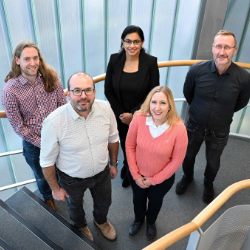-
Study
-
Quick Links
- Open Days & Events
- Real-World Learning
- Unlock Your Potential
- Tuition Fees, Funding & Scholarships
- Real World Learning
-
Undergraduate
- Application Guides
- UCAS Exhibitions
- Extended Degrees
- School & College Outreach
- Information for Parents
-
Postgraduate
- Application Guide
- Postgraduate Research Degrees
- Flexible Learning
- Change Direction
- Register your Interest
-
Student Life
- Students' Union
- The Hub - Student Blog
- Accommodation
- Northumbria Sport
- Support for Students
-
Learning Experience
- Real-World Learning
- Research-enriched learning
- Graduate Futures
- The Business Clinic
- Study Abroad
-
-
International
International
Northumbria’s global footprint touches every continent across the world, through our global partnerships across 17 institutions in 10 countries, to our 277,000 strong alumni community and 150 recruitment partners – we prepare our students for the challenges of tomorrow. Discover more about how to join Northumbria’s global family or our partnerships.
View our Global Footprint-
Quick Links
- Course Search
- Undergraduate Study
- Postgraduate Study
- Information for Parents
- London Campus
- Northumbria Pathway
- Cost of Living
- Sign up for Information
-
International Students
- Information for International Students
- Northumbria and your Country
- International Events
- Application Guide
- Entry Requirements and Education Country Agents
- Global Offices
- English Requirements
- English Language Centre
- International student support
- Cost of Living
-
International Fees and Funding
- International Undergraduate Fees
- International Undergraduate Funding
- International Masters Fees
- International Masters Funding
- International Postgraduate Research Fees
- International Postgraduate Research Funding
- Useful Financial Information
-
International Partners
- Agent and Representatives Network
- Global Partnerships
- Global Community
-
International Mobility
- Study Abroad
- Information for Incoming Exchange Students
-
-
Business
Business
The world is changing faster than ever before. The future is there to be won by organisations who find ways to turn today's possibilities into tomorrows competitive edge. In a connected world, collaboration can be the key to success.
More on our Business Services-
Business Quick Links
- Contact Us
- Business Events
- Research and Consultancy
- Education and Training
- Workforce Development Courses
- Join our mailing list
-
Education and Training
- Higher and Degree Apprenticeships
- Continuing Professional Development
- Apprenticeship Fees & Funding
- Apprenticeship FAQs
- How to Develop an Apprentice
- Apprenticeship Vacancies
- Enquire Now
-
Research and Consultancy
- Space
- Energy
- AI and Tech
- CHASE: Centre for Health and Social Equity
- NESST
-
-
Research
Research
Northumbria is a research-rich, business-focused, professional university with a global reputation for academic quality. We conduct ground-breaking research that is responsive to the science & technology, health & well being, economic and social and arts & cultural needs for the communities
Discover more about our Research-
Quick Links
- Research Peaks of Excellence
- Academic Departments
- Research Staff
- Postgraduate Research Studentships
- Research Events
-
Research at Northumbria
- Interdisciplinary Research Themes
- Research Impact
- REF
- Partners and Collaborators
-
Support for Researchers
- Research and Innovation Services Staff
- Researcher Development and Training
- Ethics, Integrity, and Trusted Research
- University Library
- Vice Chancellors Fellows
-
Research Degrees
- Postgraduate Research Overview
- Doctoral Training Partnerships and Centres
- Academic Departments
-
Research Culture
- Research Culture
- Research Culture Action Plan
- Concordats and Commitments
-
-
About Us
-
About Northumbria
- Our Strategy
- Our Staff
- Our Schools
- Place and Partnerships
- Leadership & Governance
- University Services
- Northumbria History
- Contact us
- Online Shop
-
-
Alumni
Alumni
Northumbria University is renowned for the calibre of its business-ready graduates. Our alumni network has over 253,000 graduates based in 178 countries worldwide in a range of sectors, our alumni are making a real impact on the world.
Our Alumni - Work For Us
What will I learn on this module?
The module is designed to meet the needs of health and care professionals working in Advanced Clinical Practice roles across a diverse range of speciality and subject-specific areas. It will equip you with the knowledge, skills, and behavioural capabilities to transform service delivery and secure continuous quality improvement. It will further enable you to identify and appraise existing knowledge or generate new knowledge in the context of uncertain and complex healthcare systems.
Designed to support you to critically engage in research and service improvement activity, it has also been closely aligned with the Multi-professional framework for advanced clinical practice in England, research capability pillar (Health Education England (HEE), 2017; p.10). A key focus of this module will be to identify ways in which you can critically engage in research activity, identify the need for further research or service improvements and facilitate collaborative research links. Support being provided to apply the learning within context of individual practice, disciplines, and professional interests.
Throughout the module, you will engage in a wide variety of authentic learning activities and critically examine aspects of the research process and service improvement methods. Utilising good research practice guidance and appraising a range of validated methodologies you will develop a broad understanding of how the various approaches can be used to enhance care provision, promote safety, and improve productivity.
Module tutors who are also active researchers will support you to adopt a critical and reflexive approach, bringing the research and your role in shaping it to life.
How will I learn on this module?
As a collaborative research community, your cohort will engage in a wide variety of teaching and learning strategies. Learning will be focussed on tangible outcomes and the final assessment to ensure you are clear and mindful of the formative and summative assessment criteria. The content will be delivered by research-active academics ensuring it is research informed and relevant for your clinical roles. Seminars will be used to critically explore contemporary approaches to research, service evaluation and service improvement. A range of directed activities will be undertaken to benchmark knowledge drivers in your organisation, identify gaps in practice and facilitate the formation of collaborative links. Workshops exploring the prevalent research philosophies, methodologies and methods associated with a range of research traditions and peer group work will help to develop and present your research ideas.
Specifically, you will learn about:
• Searching and synthesising the literature to formulate a research question, or service improvement initiative
• Philosophical assumptions and foundations of enquiry
• Qualitative, quantitative, and mixed method approaches
• Service improvement methodologies
• Data collection and data analysis
• Research governance and ethical issues
How will I be supported academically on this module?
During the module you will be provided with robust support and guidance to help meet your individual learning and research needs. The module lead will provide guidance and academic counselling on the formative and summative assessment opportunities to ensure that you are able to confidently engage with the academic rigour of this module.
Ongoing feedback will be available during the lectures, seminars, workshops, and group/individual tutorials will be provided. Extensive support is also provided online as part of the University’s commitment to technology enhanced learning and the module will utilise Blackboard Ultra, EMA, digital reading lists, digital communication, social networking, and collaborative tools.
A central feature of the academic support available to you is the service provided by the University Library. This 24/7 service caters for all your learning needs, has extensive access to electronic texts and tutorials and supports the development of academic skills aimed at improving your critical thinking and analytical skills. Many of the electronic texts can be accessed via electronic reading lists.
You will also be supported to form proactive and collaborative links by networking with clinical colleagues, research and development departments and other active researchers.
What will I be expected to read on this module?
All modules at Northumbria include a range of reading materials that students are expected to engage with. Online reading lists (provided after enrolment) give you access to your reading material for your modules. The Library works in partnership with your module tutors to ensure you have access to the material that you need.
What will I be expected to achieve?
Knowledge & Understanding (K&U):
K&U 1. Critically appraise and synthesise a range of research approaches, using the findings to underpin practice development.
2. Identify relevant ethical and governance issues and engage in strategies for their surveillance and management.
Intellectual/Professional skills & abilities (IPSA):
IPSA 3. Critically reflect upon and evaluate competence to audit clinical practice and select reliable methods to ensure best practice.
4. Demonstrate a systematic understanding of evidence-based knowledge and validate strategies to address the deficits in a safe and effective way
Personal Values Attributes (Global / Cultural awareness, Ethics, Curiosity) (PVA):
PVA 5. Appraise your role within the research process and identify strategies to form collaborative links with other active researchers.
How will I be assessed?
Formative Assessment, Learning activities, tasks and taught session.
Workshops/Seminars/Lectures: exploring real world research and service improvement initiatives, critique of research and its development within health and care sectors.
Peer reviewed presentation identifying a research topic or service improvement topic.
Reflection on own and others development and engagement in a peer reviewed presentation of proposal outline.
Feedback will be on an ongoing basis via seminars and tutorials.
Summative assessment
Research Proposal (2500 words) outlining a plan for an empirical research project OR practice project OR systematic appraisal. Individualised feedback will be given electronically. (All MLO assessed).
Pre-requisite(s)
none
Co-requisite(s)
none
Module abstract
This service improvement and research methods module has been designed to reflect the requirements of the HEE (2017) research pillar for students working in Advanced Clinical Practice roles across a diverse range of speciality and subject-specific areas. It introduces you to the knowledge, skills and behaviours required to transform service delivery and secure continuous quality improvement. It will further enable you to work collaboratively with research active colleagues and you will be given the opportunity to share good practice with peers and establish contact with local research networks and forums.
You will be encouraged to actively debate and explore evidence-based practice, research and service improvement case studies relating the findings to your sector and consider how your practice can be transformed to meet personal, organisational, and national drivers. You will be assessed using engaging strategies designed to support your practice and allow you to find solutions to authentic issues supported by research and current debate.
Throughout the module, you will engage in a wide variety of authentic learning activities and critically examine aspects of the research process and service improvement methods including its visibility and impact. Utilising good research practice guidance and appraising a range of validated methodologies you will develop a broad understanding of how the various approaches can be used to enhance care provision, promote safety, and improve productivity.
Course info
Credits 20
Level of Study Postgraduate
Mode of Study 3 years Part Time
Location City Campus, Northumbria University
City Newcastle
Start January 2027
Study at Northumbria
- Artificial Intelligence (Extended Degree) BSc (Hons)
- Electrical Engineering (Top-Up) BEng (Hons)
- Geography (Extended Degree) BA (Hons)
- Preventive Conservation MA
- Electrical and Electronic Engineering MSc
- Electrical and Electronic Engineering MSc
- Electrical and Electronic Engineering (with Advanced Practice) MSc
- Biological Sciences (Extended Degree) BSc (Hons)
- Biological Sciences BSc (Hons)
- Project Management BSc (Hons) | Apprenticeship | QA
- Aerospace Satellite Engineering BEng (Hons)
- Aerospace Satellite Engineering (Extended Degree) BEng (Hons)
- Aerospace Satellite Engineering MEng (Hons)
- Aerospace Satellite Engineering MSc
- Aerospace Satellite Engineering MSc
- Aerospace Satellite Engineering (with Advanced Practice) MSc
- Environmental Science (Extended Degree) BSc (Hons)
- Geography (Extended Degree) BSc (Hons)
- Physical Geography (Extended Degree) BSc (Hons)
- Police Constable Degree Apprenticeship | Northumbria Police
- Business and Management BA (Hons) - Distance Learning
- Primary Education (Extended Degree) BA (Hons)
- Mechanical Engineering (Extended Degree) BEng (Hons) (i2i International Soccer Academy)
- Financial Mathematics (Extended Degree) BSc (Hons)
- Geography BSc (Hons)
- Midwifery Studies (Extended Degree) BSc (Hons)
- Nursing Science Registered Nurse (Adult) (Extended Degree) BSc (Hons)
- Nursing Science Registered Nurse (Child) (Extended Degree) BSc (Hons)
- Nursing Science, Registered Nurse (Mental Health) (Extended Degree) BSc Hons
- Occupational Therapy (Extended Degree) BSc (Hons)
- Physical Geography BSc (Hons)
- Physiotherapy (Extended Degree) BSc (Hons)
- Professional Policing (Extended Degree) BSc (Hons)
- Police Constable Degree Apprenticeship | Durham Constabulary
- Psychology (Extended Degree) BSc (Hons)
- Psychology with Criminology (Extended Degree) BSc (Hons)
- Social Work (Extended Degree) BSc (Hons)
- Sport and Exercise Science (Extended Degree) BSc (Hons) (i2i International Soccer Academy)
- Sport, Exercise and Nutrition (Extended Degree) BSc (Hons) (i2i International Soccer Academy)
- Law (Extended Degree) LLB (Hons)
- Neurodiversity and Inclusive Practice MA
- Neurodiversity and Inclusive Practice MA
- Forensic Psychology MSc
- Forensic Psychology MSc
- Tourism and Visitor Economy MSc
- Automotive Engineering (Extended Degree) BEng (Hons)
- Architecture (Extended Degree) BA (Hons)
- Business and Marketing (Extended Degree) BA (Hons)
- Business and Supply Chain Management (Extended Degree) BA (Hons)
- Business Management (Extended Degree) BA (Hons)
- Digital Design (Extended Degree) BA (Hons)
- English Language and Literature (Extended Degree) BA (Hons)
- English Language (Extended Degree) BA (Hons)
- English Literature and American Studies (Extended Degree) BA (Hons)
- English Literature and History (Extended Degree) BA (Hons)
- English Literature (Extended Degree) BA (Hons)
- Fashion Business (Top-Up) BA (Hons)
- Fashion Communication (Extended Degree) BA (Hons)
- Fashion Design and Marketing (Extended Degree) BA (Hons)
- Fashion (Extended Degree) BA (Hons)
- Film (Extended Degree) BA (Hons)
- Fine Art (Extended Degree) BA (Hons)
- Furniture and Product Design (Extended Degree) BA (Hons)
- Graphic and Digital Design (Top-Up) BA (Hons)
- Graphic Design (Extended Degree) BA (Hons)
- History and American Studies (Extended Degree) BA (Hons)
- Interior Design (Extended Degree) BA (Hons)
- International Relations and Politics (Extended Degree) BA (Hons)
- Marketing (Extended Degree) BA (Hons)
- Media and Communication (Extended Degree) BA (Hons)
- Product Design (Extended Degree) BA (Hons)
- Theatre and Performance (Extended Degree) BA (Hons)
- Tourism and Events Management (Extended Degree) BA (Hons)
- Civil Engineering (Extended Degree) BEng (Hons)
- Civil Engineering Degree Apprenticeship | Northumbria University
- Mechanical Engineering (Extended Degree) BEng (Hons)
- Biochemistry (Extended Degree) BSc (Hons)
- Biomedical Science (Extended Degree) BSc (Hons)
- Building Surveying (Extended Degree) BSc (Hons)
- Business and Analytics (Extended Degree) BSc (Hons)
- Business Computing (Extended Degree) BSc (Hons)
- Chemistry (Extended Degree) BSc (Hons)
- Computer Science (Extended Degree) BSc (Hons)
- Computing (Top-Up) BSc (Hons)
- Criminology and Forensic Science (Extended Degree) BSc
- Criminology (Extended Degree) BSc (Hons)
- Data Science (Extended Degree) BSc (Hons)
- Economics and Finance (Extended Degree) BSc (Hons)
- Economics (Extended Degree) BSc (Hons)
- Finance and Investment Management (Extended Degree) BSc (Hons)
- Food Science and Nutrition (Extended Degree) BSc (Hons)
- Football Coaching and Performance (Extended Degree) BSc (Hons)
- Football Coaching and Performance BSc (Hons)
- Forensic Science (Extended Degree) BSc (Hons)
- Games Computing (Extended Degree) BSc (Hons)
- International Business Management (Extended Degree) BSc (Hons)
- Mathematics (Extended Degree) BSc (Hons)
- Physics (Extended Degree) BSc (Hons)
- Physics with Astrophysics (Extended Degree) BSc (Hons)
- Sociology (Extended Degree) BSc (Hons)
- Sport and Exercise Science (Extended Degree) BSc (Hons)
- Sport Coaching (Extended Degree) BSc (Hons)
- Sport, Exercise and Nutrition (Extended Degree) BSc (Hons)
- Sport Management (Extended Degree) BSc (Hons)
- English Literature and Creative Writing (Extended Degree) BA (Hons)
- Nursing Associate Apprenticeship | Foundation Degree in Science (FdSc) | Northumbria University
- Nursing Associate FdSc
- Neurodiversity and Inclusive Practice MA
- Sport Coaching (Extended Degree) BSc (Hons) (i2i International Soccer Academy)
- Sport Management (Extended Degree) BSc (Hons) (i2i International Soccer Academy)
- Advanced Musculoskeletal Physiotherapy Practice
- English Language BA (Hons)
- History (Extended Degree) BA (Hons)
- Accounting (Extended Degree) BSc (Hons)
- Environmental Science BSc (Hons)
- Social Work | Degree Apprenticeship BSc (Hons)
- Industrial Design MA MSc
- International Business Management MSc
- Global Development MSc
- Global Development MSc
- Global Development MSc
- Healthcare Leadership and Management MSc
- MA Design for Social and Environmental Innovation
- Spatial and Environmental Design MA
- Fashion Design and Marketing BA (Hons)
- Product Design BA (Hons)
- Communication Design MA
- Fashion Design MA
- Sustainable and Ethical Fashion MA
- Design Foundation Year
- Fashion Communication BA (Hons)
- Digital Design BA (Hons)
- Furniture and Product Design BA (Hons)
- Fashion BA (Hons)
- Interior Design BA (Hons)
- Graphic Design BA (Hons)
- Digital and Technology Solutions - Business Analyst | Degree Apprenticeship | QA
- Digital and Technology Solutions – Computing Data Analyst | Degree Apprenticeship | QA
- MSc Advanced Clinical Practitioner - Degree Apprenticeship
- Digital and Technology Solutions – Cyber Security | Degree Apprenticeship | QA
- Digital and Technology Solutions – IT Consultant | Degree Apprenticeship | QA
- Law (Space Law) LLM
- Digital and Technology Solutions – Network Engineer | Degree Apprenticeship | QA
- Law LLB (Hons)
- Digital and Technology Solutions – Software Engineer | Degree Apprenticeship | QA
- Sleep and Chronobiology MRes
- Financial Mathematics BSc (Hons)
- Eye Movement Desensitisation & Reprocessing (EMDR) Therapy - Postgraduate Certificate
- Master of Business Administration and Master of Public Administration | Northumbria
- MBA
- MPA
- Pre-sessional English Language and Study Skills
- Pre-sessional English Language and Study Skills
- Pre-sessional English Language and Study Skills
- Law (Cyber Law) LLM
- Professional Practice in Health - Postgraduate Certificate | Northumbria University
- Community Specialist Practitioner (Adult Social Care Nursing) Postgraduate Diploma
- Community Specialist Practitioner (Adult Social Care Nursing) Postgraduate Diploma
- Community Specialist Practitioner (Children's Nursing) Postgraduate Diploma
- Community Specialist Practitioner (Children's Nursing) Postgraduate Diploma
- Community Specialist Practitioner (District Nursing) Postgraduate Diploma
- Community Specialist Practitioner (District Nursing) Postgraduate Diploma
- Community Specialist Practitioner (General Practice Nursing) Postgraduate Diploma
- Community Specialist Practitioner (General Practice Nursing) Postgraduate Diploma
- Cyber Security MSc (London)
- Cyber Security Technology MSc (London)
- Specialist Community Public Health Nursing (Health Visiting) Postgraduate Diploma
- Healthcare Leadership and Management MSc
- Specialist Community Public Health Nursing (Health Visiting) Postgraduate Diploma
- Healthcare Leadership and Management MSc
- Specialist Community Public Health Nursing (School Nursing) Postgraduate Diploma
- Specialist Community Public Health Nursing (School Nursing) Postgraduate Diploma
- Business Analytics MSc
- Finance MSc
- International Finance and Investment MSc
- Digital and Immersive Arts MA
- Marketing MSc
- Engineering Management with Advanced Practice MSc
- Engineering Management MSc
- Engineering Management MSc
- BSC (HONS) GLOBAL BUSINESS MANAGEMENT (HUMAN RESOURCES) (SINGAPORE)
- Global Logistics, Operations and Supply Chain Management MSc
- International Business Management MSc
- BSC (HONS) GLOBAL BUSINESS MANAGEMENT (LOGISTICS AND SUPPLY CHAIN) COMPLETION AWARD (SINGAPORE)
- BSC (HONS) GLOBAL BUSINESS MANAGEMENT (LOGISTICS AND SUPPLY CHAIN) (HONG KONG) (SUBJECT TO VALIDATION)
- Leading Positive Behavioural Support in Organisations - Advanced Diploma
- Specialist Community Public Health Nursing (School Nursing) Higher Apprenticeship | Northumbria University
- Specialist Community Public Health Nursing (Health Visiting) Higher Apprenticeship
- Leading Positive Behavioural Support in Organisations - Postgraduate Certificate
- Social Work BSc (Hons)
- Community Specialist Practitioner Higher Apprenticeship
- Real Estate MSc with Advanced Practice
- BSC (HONS) INTERNATIONAL TOURISM, HOSPITALITY AND EVENTS COMPLETION AWARD (SINGAPORE)
- Business and Entrepreneurship BA (Hons)
- Film BA (Hons)
- Fine Art BA (Hons)
- Media and Communication BA (Hons)
- Electrical and Electronic Engineering BEng (Hons)
- Business and Analytics BSc (Hons)
- Health and Social Practice (Clinical) BSc
- Film, Media, Theatre and Performance Foundation Year
- Sport Foundation Year (i2i International Soccer Academy)
- Conservation of Fine Art (Easel Paintings) MA
- Conservation of Fine Art (Works of Art on Paper) MA
- Electrical and Electronic Engineering MEng (Hons)
- International Hospitality and Tourism Management MSc
- Teacher Training in School PGCE
- Business and Human Resource Management BA (Hons)
- Business and Supply Chain Management BA (Hons)
- Business Management BA (Hons)
- Doctor of Sport and Exercise Psychology
- Doctor of Sport and Exercise Psychology
- Doctor of Sport
- Doctor of Sport
- Theatre and Performance BA (Hons)
- Tourism and Events Management BA (Hons)
- Automotive Engineering BEng (Hons)
- Mechanical Engineering BEng (Hons)
- Accounting and Finance (Top-Up) BSc (Hons) (London)
- Accounting and Finance (Top-Up) BSc (Hons)
- Accounting and Finance (Top-Up) BSc (Hons)
- Accounting BSc (Hons)
- Computing with Cyber Security Technology BSc (Hons) (London)
- Computing with Information Technology Management BSc (Hons) (London)
- Computing with Technology BSc (Hons) (London)
- Master of Public Health (Palliative and End-of-Life Care)
- Global Business Management (Marketing) (Top-Up) BSc (Hons)
- Master of Public Health (Palliative and End-of-Life Care)
- Global Business Management (Top-Up) BSc (Hons)
- Health and Social Care BSc (Hons)
- International Business Management BSc (Hons)
- Occupational Therapist Degree Apprenticeship | Occupational Therapy BSc (Hons)
- Operating Department Practitioner Degree Apprenticeship | Operating Department Practice BSc (Hons)
- Operating Department Practice BSc (Hons)
- Construction Quantity Surveyor Degree Apprenticeship | Quantity Surveying (Construction) BSc (Hons)
- Chartered Surveyor Degree Apprenticeship | Quantity Surveying BSc (Hons)
- Sport and Exercise Science BSc (Hons) (i2i International Soccer Academy)
- Sport and Exercise Science BSc (Hons)
- Sport Coaching BSc (Hons) (i2i International Soccer Academy)
- Sport Coaching BSc (Hons)
- Sport, Exercise and Nutrition BSc (Hons) (i2i International Soccer Academy)
- Sport, Exercise and Nutrition BSc (Hons)
- Sport Management BSc (Hons) (i2i International Soccer Academy)
- Creative and Cultural Industries Management MA
- Sport Management BSc (Hons)
- Creative Writing MA
- Creative Writing MA
- Criminology BSc (Hons)
- Business and Marketing BA (Hons)
- Criminology and Criminal Justice MA
- Criminology and Criminal Justice MA
- Global Sustainable Business Management MSc
- Doctorate of Design
- Criminology and Forensic Science BSc (Hons)
- Criminology and Sociology BSc (Hons)
- Doctorate of Design
- Cyber Security MSc (London)
- Economics BSc (Hons)
- Cyber Security MSc (London)
- Education MA
- Data Protection Law and Information Governance Postgraduate Certificate
- Design MRes
- Finance and Investment Management BSc (Hons)
- Design MRes
- Digital Marketing MSc (London)
- Digital Marketing MSc
- Health, Education and Social Care Foundation Year
- Digital Marketing (with Advanced Practice) MSc (London)
- Disaster Management and Sustainable Development MSc
- Disaster Management and Sustainable Development MSc
- Doctor of Philosophy (PhD)
- International Banking and Finance (Top-Up) BSc (Hons)
- Electrical Power Engineering MSc
- Electrical Power Engineering MSc
- Creative and Cultural Industries Management MA
- English Language and Literature BA (Hons)
- English Literature MA
- English Literature MA
- English Literature MA
- English Literature MA
- English Literature MRes
- English Literature and Creative Writing BA (Hons)
- English Literature and History BA (Hons)
- English Literature BA (Hons)
- English Literature MRes
- Environmental Science BSc (Hons)
- Food Science and Nutrition BSc (Hons)
- Forensic Accounting MSc
- Forensic Science MSc
- Forensic Science MSc
- Forensic Science BSc (Hons)
- Education (Leadership and Management) MA
- Geography BA (Hons)
- Geography BSc (Hons)
- Education (Teaching and Learning) MA
- Guidance and Counselling BA (Hons)
- Health Psychology MSc
- Health Psychology MSc
- Marketing BA (Hons)
- History MA
- History MRes
- History MA
- History MRes
- History and Politics BA (Hons)
- History BA (Hons)
- History MA
- History MA
- Humanities Foundation Year
- Interior Architecture Postgraduate Certificate
- International Business Management MSc
- Sport Performance and Analysis MSc
- Strength and Conditioning MSc
- Strength and Conditioning MSc
- Mathematics, Physics, and Electrical Engineering Foundation Year
- Mechanical and Civil Engineering Foundation Year
- International Finance and Investment MSc
- Four Year Doctor of Medicine (MD4)
- Automotive Engineering MEng (Hons)
- International Relations and Politics BA (Hons)
- Cyber Security (with Advanced Practice) MSc (London)
- Mechanical Engineering MEng (Hons)
- International Sport Management MSc
- Midwifery Studies BSc (Hons)
- Business with Financial Management MSc (London)
- Artificial Intelligence Technology MSc (London)
- LLM Professional Legal Practice
- Artificial Intelligence Technology MSc (London)
- Big Data and Data Science Technology MSc (London)
- Business and Management BA (Hons) Top Up
- Big Data and Data Science Technology MSc (London)
- Business and Management MSc
- Business and Management MSc
- Business and Management MSc
- Business and Management MSc
- Clinical Exercise Physiology MSc
- Clinical Exercise Physiology MSc
- Computer Science with Artificial Intelligence MSc
- Computer Science with Data Analytics MSc
- Data Science MSc
- Digital Marketing MSc
- Entrepreneurship and Innovation Management MSc
- Entrepreneurship and Innovation Management MSc
- Master of Public Health
- Mathematics BSc (Hons)
- Mathematics MMath (Hons)
- Global Logistics Operations and Supply Chain Management MSc (London)
- Global Logistics Operations and Supply Chain Management MSc (London)
- Mathematics MSc
- Midwifery Studies MSc
- Occupational and Organisational Psychology MSc
- Occupational Therapy (Pre-Registration) MSc
- Psychology MSc
- Mental Health Law and Practice Certificate
- Microbiology MSc
- Microbiology MSc
- Business with Entrepreneurship MSc (London)
- Sport and Exercise Nutrition MSc
- Sport and Exercise Nutrition MSc
- Sport Performance and Analysis MSc
- Web & Mobile Development Technologies MSc (London)
- Business with Marketing Management MSc (London)
- Electrical Power Engineering MSc
- NEBOSH National General Certificate in Occupational Health and Safety (Distance Learning)
- NEBOSH National General Certificate in Occupational Health and Safety (Part-Time)
- NEBOSH National Diploma in Occupational Health and Safety (Distance Learning mode)
- NEBOSH National Diploma in Occupational Health and Safety (Part-Time)
- Nursing Science BSc (Hons)
- Occupational Therapy BSc (Hons)
- Nutritional Science MSc
- Nutritional Science MSc
- Occupational and Organisational Psychology MSc
- Occupational and Organisational Psychology MSc
- Physical Geography BSc (Hons)
- Physics BSc (Hons)
- Physics MPhys (Hons)
- Physics with Astrophysics BSc (Hons)
- Physics with Astrophysics MPhys (Hons)
- Physiotherapy BSc (Hons)
- Primary Education BA (Hons)
- Professional Practice in Mental Health Law Postgraduate Certificate
- Project Management MSc
- Project Management MSc
- Project Management MSc
- Psychology MRes
- Law (International Commercial Law) LLM
- Psychology MSc
- Law (Space Law) LLM
- Master of Public Health
- Medical Law Postgraduate Certificate
- Healthcare Professional Practice MRes
- Master of Public Health
- Quantity Surveying BSc (Hons)
- Advanced Computer Science MSc
- Real Estate BSc (Hons)
- Real Estate MSc
- Computing and Technology (with Advanced Practice) MSc (London)
- Social Science Foundation Year
- Cyber Security Technology (with Advanced Practice) MSc (London)
- Sociology BSc (Hons)
- Web and Mobile Development Technologies MSc
- Sport and Exercise Psychology MSc
- Bar Course LLM
- Sport and Exercise Psychology MSc
- Advanced Computer Science MSc
- Professional Doctorate in Health, Education and Society
- Advanced Computer Science MSc
- Artificial Intelligence MSc
- Business with Business Analytics MSc (London)
- Social Work MA
- Business with Business Analytics MSc (London)
- Business with Hospitality and Tourism Management MSc (London)
- Sport Foundation Year
- Business with Hospitality and Tourism Management MSc (London)
- Computer Science MSc
- English Literature and American Studies BA (Hons)
- Computer Science MSc
- History and American Studies BA (Hons)
- Computer Science MSc
- Interior Architecture BA (Hons)
- Computing and Technology MSc (London)
- Bar Course
- Cyber Security Technology MSc (London)
- Bar Course
- Cyber Security Technology (Part-Time) MSc (London)
- Bar Knowledge Course
- Finance MSc
- Bar Skills Course
- Information Security Management MSc (London)
- Biochemistry BSc (Hons)
- International Project Management MSc (London)
- International Project Management (with Advanced Practice) MSc (London)
- Marketing MSc
- Nursing Science Registered Nurse (Adult) MSc
- Registered Nurse Degree Apprenticeship | Nursing Science/ Registered Nurse (Adult) BSc (Hons)
- Nursing Science Registered Nurse (Adult) BSc (Hons)
- Nursing Science Registered Nurse (Mental Health) MSc
- Registered Nurse Degree Apprenticeship | Nursing Science/ Registered Nurse (Child) BSc (Hons)
- Psychology MSc
- Nursing Science Registered Nurse (Child) BSc (Hons)
- Surveying (Building Surveying) MSc
- Nursing Science Registered Nurse (Learning Disabilities) BSc (Hons)
- Surveying (Quantity Surveying) MSc
- Surveying (Real Estate) MSc
- Nursing Science Registered Nurse (Mental Health) BSc (Hons)
- Psychology with Criminology BSc (Hons)
- Occupational Psychology Professional Doctorate
- Professional Policing BSc (Hons)
- Psychology BSc (Hons)
- Data Science MSc
- Psychology MSc
- Data Science MSc
- Psychology Foundation Year
- Data Science MSc
- Digital Tech | Digital and Technology Solutions Specialist MSc
- Applied Linguistics for TESOL MA
- Doctor of Business Administration (DBA)
- Applied Linguistics for TESOL MA
- Doctor of Business Administration (DBA) Part-time
- Applied Sciences Foundation Year
- Architecture BA (Hons)
- Architecture MArch
- Fine Art Foundation Year
- Arts MRes
- Geography and Environmental Sciences Foundation Year
- Arts MRes
- International Relations, Conflict and Security MA
- International Relations, Conflict and Security MA
- Biomedical Science BSc (Hons)
- International Relations, Conflict and Security MA
- Biomedical Science BSc (Hons)
- Biotechnology MSc
- Biotechnology MSc
- Building Surveying BSc (Hons)
- Architecture and Built Environment Foundation Year
- Education (Teaching and Learning) MA
- Business Enterprise, Creation and Management BA (Hons) (London Campus)
- Business with Financial Management MSc (London)
- Business with Human Resource Management MSc (London)
- Business with Human Resource Management (with Advanced Practice) MSc (London)
- Luxury Brand Management MA (London)
- Chartered Manager Degree Apprenticeship | Business Leadership and Management Practice BA (Hons)
- Luxury Brand Management MA (London)
- Business with Entrepreneurship MSc (London)
- Bar Course LLM
- Business with International Management MSc (London)
- Law (Criminal Justice) LLM
- Business with International Management MSc (London)
- Law (Cyber Law) LLM
- Chemistry BSc (Hons)
- Chemistry MChem
- Childhood and Early Years Studies BA (Hons)
- Civil Engineering BEng (Hons)
- Civil Engineering MEng (Hons)
- Computing and Information Technology Foundation Year
- Construction Project Management with BIM MSc
- Construction Project Management with BIM MSc
- Construction Project Management with BIM MSc
- Preventive Conservation MA
All information is accurate at the time of sharing.
Full time Courses are primarily delivered via on-campus face to face learning but could include elements of online learning. Most courses run as planned and as promoted on our website and via our marketing materials, but if there are any substantial changes (as determined by the Competition and Markets Authority) to a course or there is the potential that course may be withdrawn, we will notify all affected applicants as soon as possible with advice and guidance regarding their options. It is also important to be aware that optional modules listed on course pages may be subject to change depending on uptake numbers each year.
Contact time is subject to increase or decrease in line with possible restrictions imposed by the government or the University in the interest of maintaining the health and safety and wellbeing of students, staff, and visitors if this is deemed necessary in future.
Useful Links
Find out about our distinctive approach at
www.northumbria.ac.uk/exp
Admissions Terms and Conditions
northumbria.ac.uk/terms
Fees and Funding
northumbria.ac.uk/fees
Admissions Policy
northumbria.ac.uk/adpolicy
Admissions Complaints Policy
northumbria.ac.uk/complaints
Any Questions?
Our Applicant Services team will be happy to help. They can be contacted on 0191 406 0901 or by using our Contact Form.
All information is accurate at the time of sharing.
Full time Courses are primarily delivered via on-campus face to face learning but could include elements of online learning. Most courses run as planned and as promoted on our website and via our marketing materials, but if there are any substantial changes (as determined by the Competition and Markets Authority) to a course or there is the potential that course may be withdrawn, we will notify all affected applicants as soon as possible with advice and guidance regarding their options. It is also important to be aware that optional modules listed on course pages may be subject to change depending on uptake numbers each year.
Contact time is subject to increase or decrease in line with possible restrictions imposed by the government or the University in the interest of maintaining the health and safety and wellbeing of students, staff, and visitors if this is deemed necessary in future.
Accessibility and Student Inclusion
Northumbria University is committed to developing an inclusive, diverse and accessible campus and wider University community and are determined to ensure that opportunities we provide are open to all.
We are proud to work in partnership with AccessAble to provide Detailed Access Guides to our buildings and facilities across our City, Coach Lane and London Campuses. A Detailed Access Guide lets you know what access will be like when you visit somewhere. It looks at the route you will use getting in and what is available inside. All guides have Accessibility Symbols that give you a quick overview of what is available, and photographs to show you what to expect. The guides are produced by trained surveyors who visit our campuses annually to ensure you have trusted and accurate information.
You can use Northumbria’s AccessAble Guides anytime to check the accessibility of a building or facility and to plan your routes and journeys. Search by location, building or accessibility feature to find the information you need.
We are dedicated to helping students who may require additional support during their student journey and offer 1-1 advice and guidance appropriate to individual requirements. If you feel you may need additional support you can find out more about what we offer here where you can also contact us with any questions you may have:
If you’d like to receive the latest updates from Northumbria about our courses, events, finance & funding then enter your details below.
* At Northumbria we are strongly committed to protecting the privacy of personal data. To view the University’s Privacy Notice please click here
Latest News and Features

Northumbria expert delivers training to help address victim-blaming language
A Northumbria University academic is leading pioneering training to support police forces across…

Northumbria University launches national AI challenge inviting young people to imagine a hopeful future
Northumbria University has launched the Hopeful Futures AI Challenge, a groundbreaking national…

Student volunteering partnership expands following five years of community impact
Following the success of a Law in the Community project, Northumbria University is expanding…

Funding awarded for innovative space technology projects
The North East Space Communications Accelerator (NESCA) has successfully awarded its first…

First cohort of Civil Engineering Degree Apprentices graduate from Northumbria
The inaugural cohort of Civil Engineering degree apprentices have graduated from Northumbria…

Global report on volunteer measurement supported by Northumbria researchers is launched
One year after Northumbria University was announced as the lead research partner on the 2026…
Upcoming events

Collaborating for Capability: Shaping the Future of Supply Chain Talent
City Campus East, Northumbria University CCE1-403
-

Archives to Action: Historical Evidence for Policy Reform
Virtual Workshop
-

Viruses of Microbes-UK (VoM-UK) Conference 2026
Northumbria University

Commercialising SHAPE Innovations and Impact
Northumbria University
-
